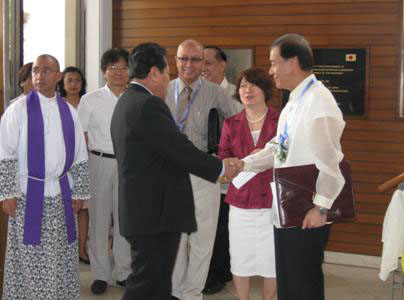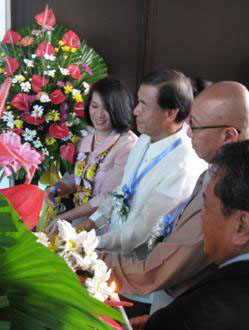
RITM Director Dr. Remigio Olveda shakes hands with The Embassy of Japan's Deputy Chief of Mission Motohiko Kato beside the marker of the National Tuberculosis Reference Laboratory . |
The Embassy of Japan's Deputy Chief of Mission Motohiko Kato delivered a congratulatory message during the 10 th anniversary celebration of the National Tuberculosis Reference Laboratory (NTRL) of the Research Institute for Tropical Medicine (RITM). The ceremony was held at the RITM-NTRL grounds on March 30, 2012. Dr .Soe Nyunt-U WHO Representative in the Philippines and Dr. Remigio Olveda RITM Director attended the ceremony. A highlight of the ceremony was the turnover of the Biosafety Laboratory Level 3 (BSL3) mainly for Multi-Drug Resistant Tuberculosis through the Global Fund to Fight AIDS, Tuberculosis and Malaria (GF).

Ribbon-Cutting Ceremony of the BSL3 |
The module - type Biosafety Laboratory Level 3 (BSL3) for TB is installed inside the NTRL through the GF. This new BSL3 meets the WHO standards of a fully operational BSL3 laboratory. The renovation enhances the functions of NTRL, which was established through a grant aid from the Government of Japan in 2000 to strengthen the National TB Control Program.
In the Kyushu-Okinawa Summit of G8 countries in 2000, Japan proposed for the fight against infectious diseases as one of major agendas and G8 member countries have confirmed the need for additional funding. This was the beginning of the establishment of the Global Fund to Fight AIDS, Tuberculosis and Malaria. As of 2011, Japan has contributed around $142 million to the Global Fund.
The RITM was established in April 1981, which was also supported by a grant aid from the Government of Japan. Both the NTRL and the RITM serves as centers and catalysts for research on infectious and tropical diseases.
Tuberculosis (TB) is one of the most life threatening diseases infecting millions of people worldwide and the fight against TB continues is a major global health concern. According to “ Global Tuberculosis Control report 2011 ”issued by WHO, the Philippines is among the 22 high-burden countries with a mortality of 33 per 100,000 people. In this context, Japan has supported various efforts of the Philippine Government and collaborated with local and international organizations to stop the spread of TB as well as other infectious diseases.
In his speech, Minister Kato cited that “Not only for TB but also for any kind of infectious disease, collaboration with the RITM is undeniably important in preventing the outbreak of infections that will endanger and disrupt many lives.”
Japan continue s to be committed to support the Philippine health sector to overcome vulnerability resulting from various risks, such as infectious diseases. Japan is the Philippines' largest source of ODA and has been a long-time friend and partner in nationwide socio-economic development. Japan believes that such cooperation between Japan and the Philippines will strengthen not only the friendship between the peoples of Japan and the Philippines, but also the existing strategic partnership between Japan and the Philippines.
Japanese Version



